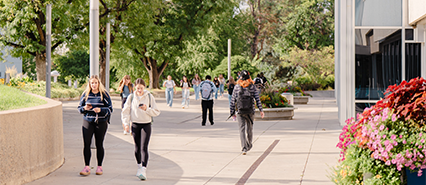Cannabis Research Institute Releases County Study
Release Date: March 15, 2018
Colorado State University-Pueblo Cannabis Institute releases impact study for Pueblo County
PUEBLO – The Institute of Cannabis Research at Colorado State University-Pueblo has released the results of a study on the impacts of legalized cannabis on Pueblo County. A preliminary report was presented to the Pueblo Board of County Commissioners on March 12. The complete 200+-page study will be available online tomorrow (Friday, March 16) at www.csupueblo.edu/ICR.
CSU-Pueblo is the first four-year, regional comprehensive university in the United States to establish a multi-disciplinary Institute of Cannabis Research. The Pueblo Board of County Commissioners allocated $50,000 of marijuana excise tax revenues for CSU-Pueblo to conduct a study regarding the impacts this legalization has had on Pueblo County. The County requested the study of social, economic, water and energy impacts as well as a recommendation regarding the buffer zone to reduce cross-contamination between low THC and high THC grow operations.
“Marijuana legalization has had a variety of effects on our community as you’ll read in the ICR’s initial report,” said CSU-Pueblo President Timothy Mottet. “The public has a desire for research with conclusive findings, but not all research designs allow for cause and effect relationships. The ICR’s mission mirrors the University, which aims to add value and contribute to the intellectual, cultural, economic, and social advancement of our community and region.”
According to Dr. Rick Kreminski, director of the Institute of Cannabis Research, this study should be interpreted as a first step in examining the complex set of issues that relate to impacts on Pueblo since the statewide vote approving Colorado Amendment 64 in November 2012 and the implementation that began in earnest in 2014. Contributors to the report included nearly 40 faculty and student researchers from a variety of disciplines.
“Further research, both quantitative and qualitative, is imperative, including important longitudinal work; and there is generally a need for more, high-quality, data collection and recording,” he said.
Kreminski said researchers conducted survey work as an initial attempt to address the relevant issues, including some focus group work, but small sample size was routinely an issue.
SOCIAL IMPACTS: The social impact study resulted in the following highlights
- A study of electronic health records of pregnant women showed no statistically significant change in marijuana use among pregnant women after legalization for the subjects in an outpatient setting. By contrast, there was a statistically significant increase in marijuana use after legalization for the subjects in the inpatient setting and those in the acute care population.
Sales and use of retail cannabis has not been legal long enough to have a major impact on Pueblo County’s population.
- Since the passage of Amendment 64, poverty has neither increased nor decreased in Pueblo. Poverty rates are persistently higher in Pueblo than in the rest of Colorado.
- While homelessness has increased in Pueblo County, the research did not find sufficient evidence for a cause and effect link between marijuana and homelessness. (For purposes of measuring economic impacts, a value of 800 homeless attributable to cannabis legalization was used.)
- Since legalization, hospital emergency rooms have experienced a more than 10 percent increase in positive drug screens for marijuana.
- Examination of data from Pueblo City and Pueblo County law enforcement, along with interviews, show that marijuana seizures have decreased in the city but not in the county.
- Overall crime has increased in the city of Pueblo, but apparently on trend with expected averages given the increase in population and decrease in police personnel; the largest increases in crime have been in property crime (particularly motor vehicle theft) and dangerous drug seizures (particularly heroin); violent crime has risen only marginally in the city, and decreased in the county.
The report included the following conclusions regarding economic impact, water and energy usage and the recommended buffer zone to reduce cross-contamination between low and high THC cannabis grow operations.
ECONOMIC IMPACTS: The overall economic impact in 2016 was estimated at $35.6M (a net revenue of $58.8M less a net cost of $23.2M).
WATER AND ENERGY IMPACTS: The water and energy impact component of the study examined water and energy use from facilities that grow cannabis and resulted in the creation of a systems dynamics model. The computer-based system dynamics model can be run provided accurate initial conditions are given and could form the basis for future work. The model will quantify the water and energy resources necessary to cultivate various kinds of cannabis.
BUFFER ZONE:
The study concluded that the 5 km (3.1 mile) buffer zone widely used in Canada and based on exclusion zones used in Europe was the recommended model. Researchers recommended that future studies focus on 1) measuring pollen distances in Colorado, and 2) measuring seed set in Cannabis at different distances from a pollen source to predict buffer distances where a tolerable amount of pollination occurs, instead of just measuring pollen. Another avenue for future studies is the viability of Cannabis pollen at different times/distances after shedding.


